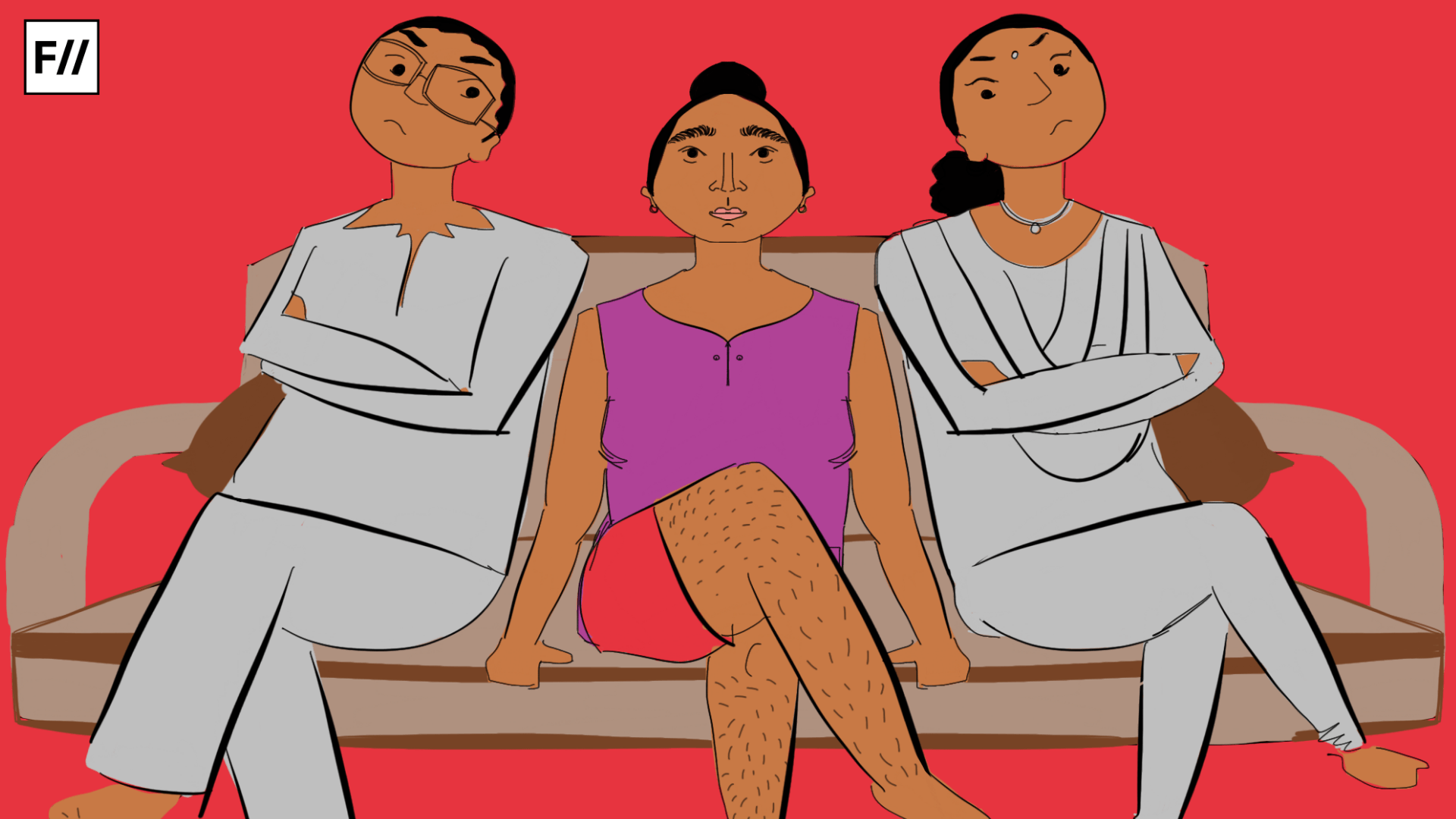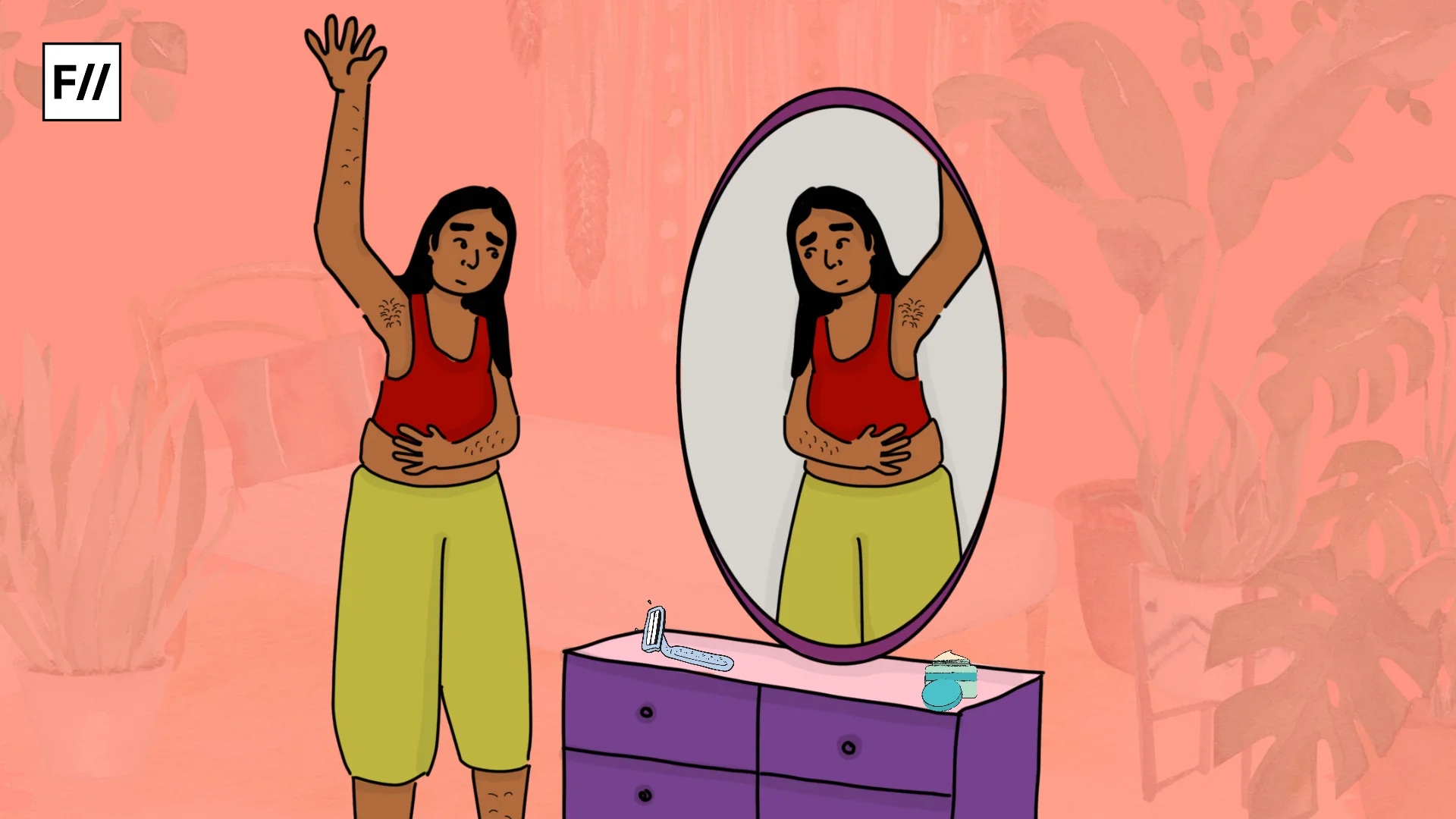When I surf through the morning newspaper with less than dead eyes, it is disappointing to enter the world of heroes and criminal made of men. If the news is really real, I wonder where real women are. Where are all the tales of violence that play in domestic settings like soft jazz? I know it does not make noise. Members of the household actually tap their feet to the tones, carrying on with their chores. Many of us barely hear one song of protest or poetry of resistance against it.
My legs are brown, fat and hairy. My family members despise them. When the lockdown was imposed, every person in the house chose convenience over the usual ‘what will people say’. One sofa was moved to join the other making the living room look horrible but comfortable for anyone deciding to share their body weight with two buddies instead of one. The code of convenience was not for me though. On a hot day of summer, I chose to offer air to my thighs and wore a pair of flared sky-blue shorts.
Why is it that even today, in this blistering summer of 2021, that women and their beautiful, thunderous, hairy, patchy thighs in a pair of cotton shorts continue to be a problem?
Why is it that even today, in the blistering summer of 2021, while large populations in the country face a heat wave which reminds us that climate change is real, that women and their beautiful, thunderous, hairy, patchy thighs in a pair of cotton shorts continue to be a problem? Until when should our bodies undergo this continuous scrutiny and shaming for merely existing while well… let us not even begin to count the privileges of the cis men in our households. And that’s where the conception of a feminist stance in this discourse began: rebellious thighs in summer shorts – to be or not to be.
Also read: The Culture Of Body Shaming And How I Overcame It
Because I have mentioned the age-long deplored term ‘feminist’, it is a reiteration that my mother was against my shorts. This hurts, but only to a limited extent. It is not the gender of the person behind patriarchy but patriarchy itself that is perpetuated by people of any gender. What hurts more is that after stamping my feet with a cry to not change into full-length pants, when I walk to my room I could not find a community which would offer me support, would hear me out. I do not see similar women resisting those pants: some out of internalised misogyny and so many others, because the fight is exhausting, the fight is futile.
In many families that I am familiar with, dupatta and salwar kameez were imposed with the same casual air with which they were almost immediately accepted. Whenever I meet these women, there is an urge to point out this misogyny to them. Often, the women who come at us with the “this is too unsanskaari” argument are the same women who have been oppressed by patriarchal structures: the same women whose laughter, mobility and body autonomy has been stifled by these structures. I want to make them listen to the violence of jazz playing in their domestic settings. On the contrary, I remain quiet, making peace with the fact that the people who cannot make up their mind to speak up, do not and should not belong to my undiscovered community.
One reason I can think of as to why violent jazz beats do not hurt the listener’s ears, who did not ask for any music, is that they have lost their sense of silence. When this music (a metaphor here for patriarchy) becomes regular and is introduced to them as soon as their genitalia is identified and their gender assumed, they become indifferent to its sound. This music (more like, cacophony) is perceived as silence. Silence is nothing but music. The listener shuts up to conform to the lessons taught.
It would be unfair, however, to not consider initiatives and campaigns gradually disseminating their fragrance. Rupali Patil, a visual artist from Mumbai, when asked about the challenges of being a woman-artist in India, shared that her work was censored by the local authorities. She used her art to mention the hiding of women’s ‘unmentionables’ so that they do not provoke men or fetch shame to the woman. The interview is open for public viewing on Youtube, but neither the video nor the campaign could gain any more than a few thousand pairs of eyes.
Also read: Fake Narratives By Pseudo-Patriarchal Science For Bodies Of All Women
Evolving magazines and journals have taken up the battle against these deep-rooted stereotypes. However, these spaces regulated by the youth are rarely in print. Not being circulated in physical form, sometimes their eccentric voice mingles with the overfed social media content.

What my thighs are to my parents and neighbours and guests and society are what nipples are to Instagram. Would Instagram ever stop shying away from women’s nipples? It is a weak system we are aiming at.
Social media can be a rich catalogue of naked bodies, cellulite on thighs and stretch marks on bodies of all colours and sizes but print media would rarely put natural skin on their front covers. What my thighs are to my parents and neighbours and guests and society are what nipples are to Instagram. Would Instagram ever stop shying away from women’s nipples? It is a weak system we are aiming at. They cannot stand hair strands on our faces, or digest the choice of oiling our pubic hair. The point however is that when a woman wears a particular type of clothing and it makes her a ‘particular’ kind of a woman, she gets exhausted from all the fighting. And when there is no newspaper lying on the center table making a headline supporting her thighs and her rights, it is a loss for the community. Exhaustion of one woman is the loss of the whole community.
Shivangi Singh (she/they) is a graduate of Gargi College, Delhi University. Having written for several organisations like Unmukti, Girl Up Bhilai, The Phosphene Magazine and The White Rose Club, she hopes to see herself imbibe the colours of art, culture, and criticism. When in need of feminist wisdom, Shivangi receives guidance from the late Maya Angelou and the late Kamla Das, through their writings. Her hobbies include penning words of structural criticism and smashing the patriarchy in her unbounded capacity.
Featured image source: Ritika Banerjee/Feminism In India




